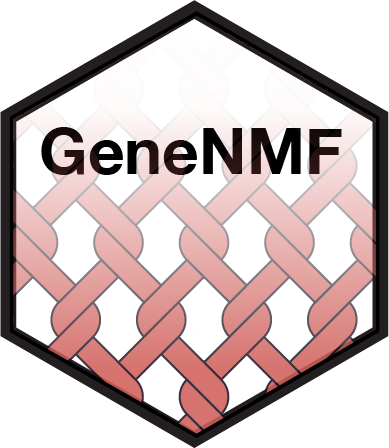Non-negative matrix factorization is a method for the analysis of high dimensional data that allows extracting sparse and meaningful features from a set of non-negative data vectors. It is well suited for decomposing scRNA-seq data, effectively reducing large complex matrices (
GeneNMF is a package that implements methods for matrix factorization and gene program discovery for single-cell omics data. It can be applied directly on Seurat objects to reduce the dimensionality of the data and to detect robust gene programs across multiple samples. For fast NMF calculation, GeneNMF relies on RcppML (see DeBruine et al. 2024).
Install release version from CRAN:
install.packages("GeneNMF")
Or for the latest version, install from GitHub:
library(remotes)
remotes::install_github("carmonalab/GeneNMF")
library(GeneNMF)
data(sampleObj)
sampleObj <- runNMF(sampleObj, k=5)
Perform NMF over a list of Seurat objects and for multiple values of k (number of NMF factors) to extract gene programs
sampleObj.list <- Seurat::SplitObject(sampleObj, split.by = "donor")
geneNMF.programs <- multiNMF(sampleObj.list, k=4:9, nfeatures = 2000) # here k from 4 to 9
Cluster gene programs from multiple samples and k's into meta-programs (MPs), i.e. consensus programs that are robustly identified across NMF runs. Compute MP metrics and most influencial MP genes.
geneNMF.metaprograms <- getMetaPrograms(geneNMF.programs, nprograms=5) # here we get 5 MPs
Find a demo of the functionalities of GeneNMF and more explanations in the following tutorial: HTML and repository.
If you used GeneNMF in your work, please cite:
Wounding triggers invasive progression in human basal cell carcinoma. Laura Yerly, Massimo Andreatta, Josep Garnica, Jeremy Di Domizio, Michel Gilliet, Santiago J Carmona, Francois Kuonen. bioRxiv 2024 10.1101/2024.05.31.596823
